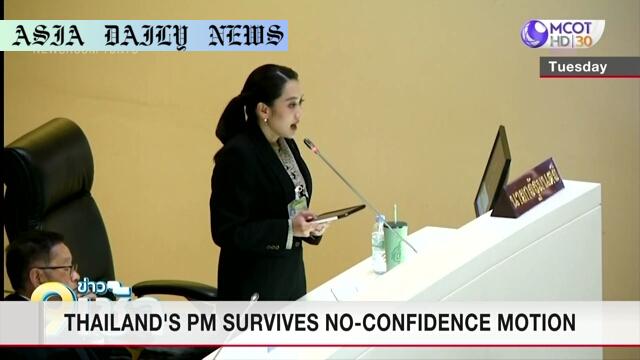No-confidence motion: Thai PM Paetongtarn Shinawatra survives significant no-confidence vote, safeguarding her leadership amidst scrutiny.
Key Point 1: Thai Prime Minister Paetongtarn Shinawatra survives a major no-confidence debate in parliament with a 319-162 vote margin.
Key Point 2: The opposition accused her of being influenced by her father, former leader Thaksin Shinawatra, and scrutinized her economic policies.
Key Point 3: Paetongtarn strongly defended her administration, stating that everyone has the right to protest in a democracy but stood firm as leader.

Thai PM Overcomes No-Confidence Vote: A Political Milestone
Thai Prime Minister Paetongtarn Shinawatra has emerged triumphant in a critical no-confidence vote held in parliament. Marking a significant political milestone, she secured the trust of the majority with a commendable voting margin of 319 to 162. The vote, which tested her leadership just months after assuming office in August, was instigated by opposition lawmakers who raised concerns about her governance style, economic aptitude, and familial influences. Despite weeks of skepticism, Paetongtarn reaffirmed her steadiness, dismissing claims of undue influence and focusing on her administration’s objectives.
Opposition's Accusations and Leadership Defenses
The debate leading to the no-confidence vote brought to light accusations from the opposition that Paetongtarn’s policies were heavily guided by her father, Thaksin Shinawatra, Thailand’s former leader. Despite Thaksin holding no official role in the government, critics alleged an overarching influence, hinting at challenges regarding nepotism and impartial governance. Additionally, her economic policies came under meticulous scrutiny, with detractors questioning her ability to navigate Thailand’s economic challenges effectively. Undeterred, Paetongtarn addressed these allegations with clarity, emphasizing her qualifications and reiterating that her leadership was guided by collective governance rather than familial interference.
A Resilient Response to Protests and Public Criticism
Facing not only parliamentary scrutiny but also public dissent reflected in recent protests, Paetongtarn showcased resilience and composure. A recent government-conducted survey revealed tepid public approval, with over half of the population expressing dissatisfaction with her administration’s performance so far. Aware of such sentiments, Paetongtarn remained grounded, stating that protests were part of a healthy democracy. In a striking statement, she reiterated her commitment to Thailand’s future: “Something you cannot ask me to resign from is being a daughter or a mother.” Through these remarks, she reaffirmed her resolve to govern with integrity despite the trials surrounding her tenure.
Broader Implications for Thailand's Political Stability
Paetongtarn Shinawatra’s political victory holds significant implications for Thailand’s domestic affairs. By overcoming alleged familial controversies and public skepticism, her administration has laid the groundwork for tackling pressing issues like economic recovery and social cohesion. While challenges persist, her successful evasion of the no-confidence motion reflects a parliamentary endorsement of stability amid political adversities. Moving forward, her ability to bridge the gap between governmental actions and public sentiment will determine the sustainability of her leadership. Moreover, her response to opposition pressures will play a pivotal role in shaping Thailand’s political narrative in the coming years.



Commentary
Prime Minister Paetongtarn Shinawatra's Resilient Leadership
The recent no-confidence vote in Thailand’s parliament brought with it several layers of complexity, not only testing Prime Minister Paetongtarn Shinawatra’s resilience but also reflecting on deeper political dynamics within the country. Her ability to dodge significant opposition criticisms and earn a decisive 319-162 vote indicates not just her leadership tenacity but also her strategic diplomacy in navigating this political hurdle. It’s a clear reminder that Thailand’s political stage, while turbulent, is also capable of pivoting towards stability when called upon by key leaders.
Navigating Accusations with Poise
Accusations against Paetongtarn—particularly those alleging her governance was influenced by her father, Thaksin Shinawatra—undoubtedly placed her under intense scrutiny. However, her composed dismissal of these claims highlighted her ability to focus on leadership rather than familial perceptions. Contentious remarks regarding her knowledge of the economy were met with not only her defenses but an overall commitment to her leadership agenda. Her rebuttals during parliamentary sessions demonstrated both courage and clarity, enforcing a much-needed assurance of her capabilities as Prime Minister.
The Road Ahead in Improving Public Perception
While her victory in parliament was reassuring, Paetongtarn’s leadership now faces another monumental challenge: bolstering public trust. Recent polls show that the general population remains skeptical of her performance, with more than half disapproving of her approaches since taking office. Yet, Paetongtarn’s resolute perspective on protests as part of a vibrant democracy shines as a hopeful note. If her actionable policies align with public expectations and foster economic growth and stability, there’s no doubting her potential to renew faith among citizens.